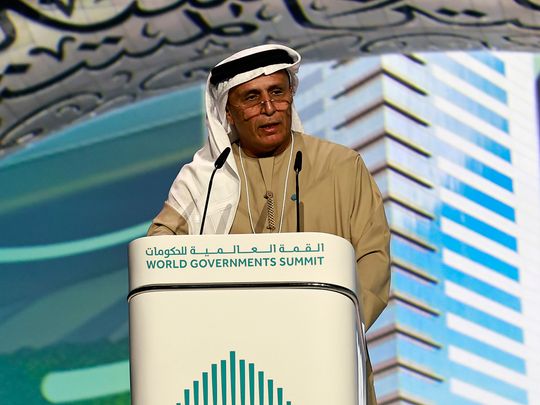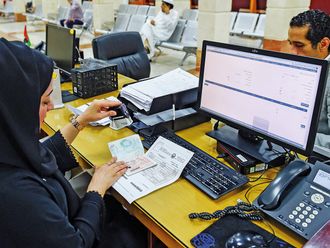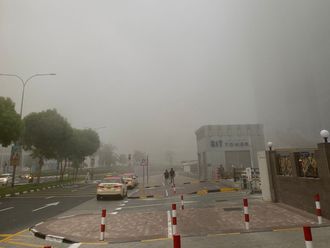
Dubai: Smart infrastructure and self-driving transport powered by Artificial Intelligence (AI) and Big Data will save billions of dirhams, Dubai’s transport chief told the World Governments Summit in Dubai on Tuesday.
Mattar Al Tayer, Director-General and Chairman of the Board of Executive Directors of the Roads and Transport Authority (RTA) said: “Dubai has been at the forefront of investing in such smart systems and getting great results.
He added that the RTA has been making strides in its plan for the Dubai Strategy for Self-Driving Transport, which aims to transition 25 per cent of trips to self-driving modes by 2030. “This initiative is projected to yield an estimated saving of Dh22 billion while improving the safety, efficiency, and sustainability of Dubai’s transport network.”
Future of smart infrastructure
Al Tayer said that government leaders are responsible for shaping future governments, providing opportunities and well-being for all citizens and populations and building future cities that enhance the quality of life.
However, this comes with key challenges. “Among the challenges facing us today is how we can utilise urban planning and infrastructure development to build smart and sustainable cities,” said Al Tayer.
“Through Dubai’s experience, we have learned that the economy of future cities must be able to face challenges and crises. To achieve that, governments must adopt transformative strategies.”
Citing an example of Dubai’s successes by tapping into the potential of smart infrastructure, Al Tayer said that smart infrastructure investments in Dubai have resulted in economic savings of Dh290 billion UAE from 2006 until today.
Moreover, the government allocated a total of Dh140 billion for the development of roads and transport systems during that period.
Al Tayer said Dubai’s agile governance style, focused on providing a robust smart infrastructure, has led to the Emirate thriving in a service-based economy, and the sector’s contribution has reached 54 per cent of its GDP.
Future mobility
Smart infrastructure has been a driving force behind the RTA’s urban planning, with the entity announcing its plans to take to the skies with the launch of its air taxi services in 2026—the deal was announced on the first day of WGS.
On Monday, the RTA chief had inaugurated the ‘Future of Mobility Forum’ at the World Government Summit. Al Tayer, who is also Commissioner-General for Infrastructure, Urban Planning and Well-Being Pillar, had said: “The inspiring vision of His Highness Sheikh Mohammed bin Rashid Al Maktoum, Vice President, Prime Minister of the UAE, Ruler of Dubai is the key driver of Dubai’s success in delivering a unique global model. His Highness has set up and led a specialised task force to realise the city’s visionary goals. Through the strategic integration of advanced technologies and clear governmental support for innovation, Dubai has surmounted numerous challenges.”
“The significance of the Future of Mobility Forum at the World Governments Summit is accentuated by its alignment with global trends towards achieving sustainable solutions. The discussions in the forum will be crucial in shaping future policies and strategies of the industry, serving as a catalyst for transformative change. By convening industry experts, policymakers, and financial leaders, the forum aims to foster collaboration towards a more connected, sustainable, and efficient future for transportation worldwide,” he commented.
Al Tayer had highlighted Dubai’s global leadership in adopting a proactive approach to testing and implementing modern technologies and setting a model for embracing and promoting innovation across various fields, particularly in transportation.
Adopting modern technologies
Al Tayer had commented: “Dubai’s proactive stance towards embracing and experimenting with cutting-edge technologies reflects the emirate’s forward-thinking mindset. We recognise the importance of positioning Dubai as a leader in implementing advanced transportation solutions as well as developing supportive legislation such as laws regulating the testing and operation of autonomous vehicles. This framework facilitated the first demo of the Chevrolet Bolt electric autonomous vehicle in Dubai, making the city the first outside the United States operate such vehicles. RTA’s adoption of artificial intelligence and big data technologies in traffic management systems has enhanced traffic flow, reduced congestion, and improved the efficiency of mass transport. In fact, the punctuality of Dubai Metro trips has reached 99.7 per cent,” he added.
Dubai an 'innovation sandbox'
Dubai is becoming an innovation sandbox and a leading city in adopting innovative mobility solutions. RTA has organised three editions of the Dubai World Congress and Challenge for Self-Driving Transport, attracting widespread participation from experts, innovators, and investors in the field of advanced mobility. RTA has also forged strategic partnerships with companies and entities, launching new self-driving delivery services in collaboration with Careem and Talabat. Moreover, RTA launched the world’s first self-driving abra (ferry) in 2023 as well as the world’s first aerial taxi flight trial in 2017.








